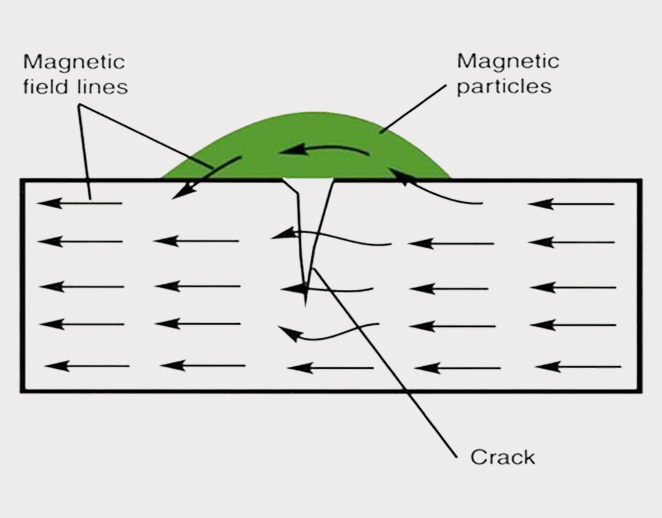An MPT can reveal various types of surface-level discontinuities and those slightly beneath the surface. These include:
- Cracks
- Inclusions
- Lack of fusion in welds
- Cold lap
- Seams
- Pores
A magnetic particle test is a common, economical and nondestructive way to uncover not-readily-visible defects that could impact a component’s performance or fitness.
A magnetic particle test is a common, economical and nondestructive way to uncover not-readily-visible defects that could impact a component’s performance or fitness.

Magnetic particle testing (MPT) is a valuable assessment method for identifying discontinuities in ferromagnetic materials that a tester can magnetize, such as iron and steel. It may also go by other names, including mag particle inspection and magnetic particle inspection (MPI).
Magnetic particle testing (MPT) is a valuable assessment method for identifying discontinuities in ferromagnetic materials that a tester can magnetize, such as iron and steel. It may also go by other names, including mag particle inspection and magnetic particle inspection (MPI).

During the process, a tester introduces a magnetic field to the material, either directly or indirectly. If the component does not have flaws, the magnetic current freely passes through the material. Conversely, if defects are present, the magnetic current shows a disruption at the site, called a flux leakage field.
Testers then apply ferrous particles — either in dry powder or as a liquid — to the component area where the disruption appears. The flux leakage field attracts these particles, revealing the discontinuity’s size and shape. Once identified, professionals can evaluate the flaw to assess its cause, characteristics, impact and remediation options.
It is key to note that flux leakage fields generally only occur when a discontinuity is perpendicular to the magnetic current’s flow. As a result, testing professionals typically conduct a second assessment perpendicular to the initial one to send the current in a different direction.
During the process, a tester introduces a magnetic field to the material, either directly or indirectly. If the component does not have flaws, the magnetic current freely passes through the material. Conversely, if defects are present, the magnetic current shows a disruption at the site, called a flux leakage field.
Testers then apply ferrous particles — either in dry powder or as a liquid — to the component area where the disruption appears. The flux leakage field attracts these particles, revealing the discontinuity’s size and shape. Once identified, professionals can evaluate the flaw to assess its cause, characteristics, impact and remediation options.
It is key to note that flux leakage fields generally only occur when a discontinuity is perpendicular to the magnetic current’s flow. As a result, testing professionals typically conduct a second assessment perpendicular to the initial one to send the current in a different direction.

Surface-level and slightly subsurface discontinuities can significantly impact the structural integrity of construction materials. They can also cause components to fall out of line with project specifications, codes or standards.
A magnetic particle test can reveal these flaws when they are not readily visible. As a result, design and manufacturing professionals can lessen potential risks by remediating the issues before construction occurs.
Surface-level and slightly subsurface discontinuities can significantly impact the structural integrity of construction materials. They can also cause components to fall out of line with project specifications, codes or standards.
A magnetic particle test can reveal these flaws when they are not readily visible. As a result, design and manufacturing professionals can lessen potential risks by remediating the issues before construction occurs.

An MPT can reveal various types of surface-level discontinuities and those slightly beneath the surface. These include:
Our MPI testing provides a fast turnaround with immediately available results. Since ECS evaluators can finish the process quickly, the test itself does not generally delay the construction schedule. Swifter identification of flaws means earlier intervention and remediation that can help keep projects on time.
The ferrous particles form easy-to-understand indications since they conform to the discontinuity’s contours. That behavior enables our professionals to gain meaningful insights into the flaw and possible remediation alternatives.
Verifying a material’s fitness for its designated application is crucial for a project’s success and for keeping end users as safe as reasonably achievable. An assessment from an experienced ECS tester also helps confirm the component meets any necessary industry requirements and project specifications.
Our MPT is compatible with numerous construction materials, such as iron, cobalt and nickel. It also works with many of their alloys, including steel and ferritic stainless steel, so we can test a wide range of components.
ECS engineers use portable MPT devices for convenience. This technology allows us to conduct tests where it works for you, so you have more time to focus on other responsibilities.
One of the key factors in MPT is the visibility of any indications. ECS uses fluorescent particles that contrast with the testing material to make the indications clear.